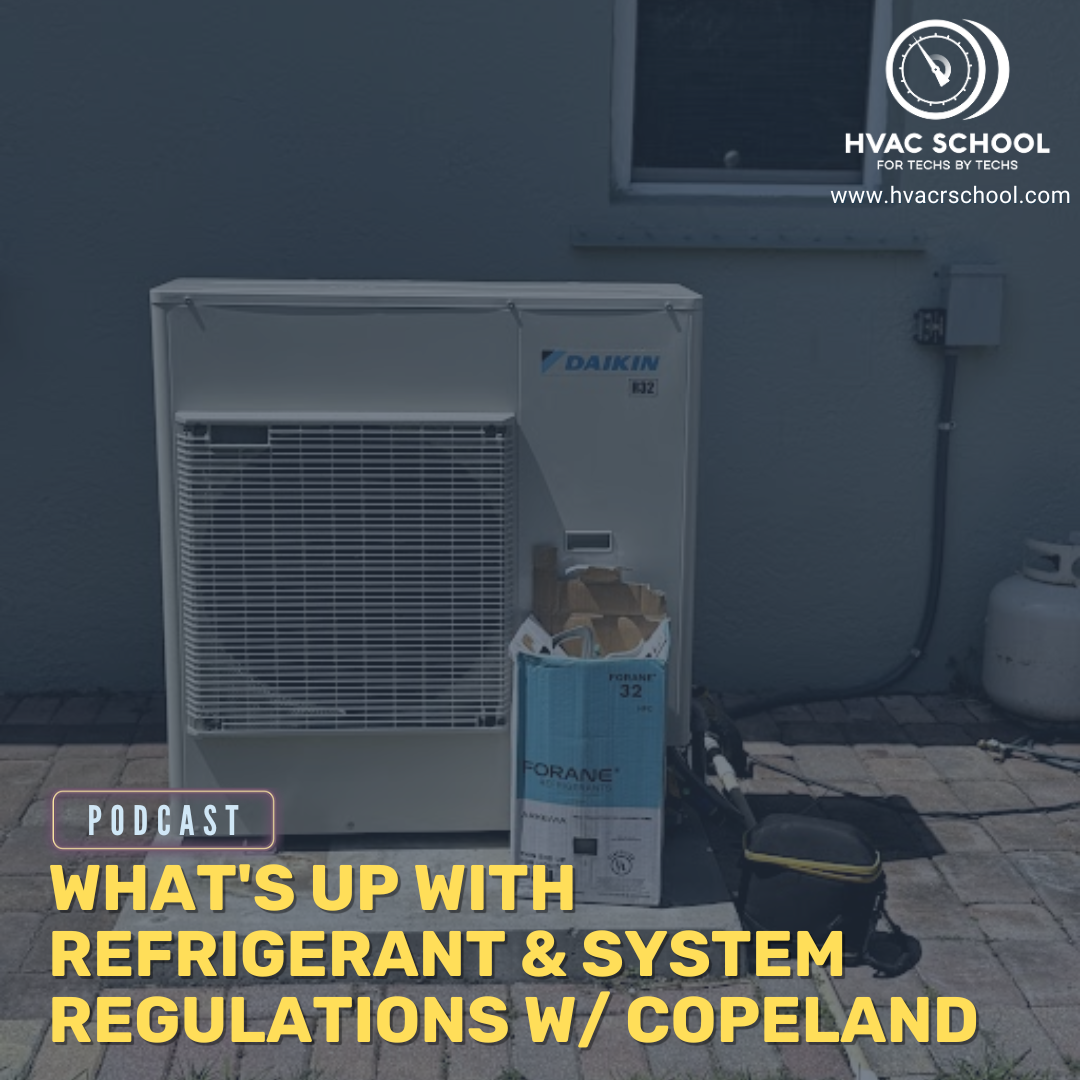What’s up with Refrigerant & System Regulations w/ Copeland

In this insightful episode of the HVAC School podcast, host Bryan sits down with Jennifer Butsch, Director of Regulatory Affairs at Copeland, to discuss the rapidly evolving regulatory environment affecting the HVAC industry. With eight years of experience at Copeland and a background spanning codes, standards, and regulatory affairs, Jennifer provides a unique perspective on the challenges and opportunities facing contractors, technicians, and manufacturers in today's market.
The conversation begins with an in-depth look at the EPA's Technology Transition Rule and the recent shift from R-410A to mildly flammable refrigerants like R-454B and R-32 as of January 1, 2025. Unlike previous refrigerant transitions that allowed for years of overlap, this transition was compressed into a much shorter timeframe due to building code requirements for the new mildly flammable refrigerants. While equipment delivery has gone relatively smoothly, the industry has faced significant challenges with refrigerant availability, particularly R-454B service gas. Jennifer discusses how OEMs have responded creatively, including pre-charging units with additional refrigerant and providing recovery cylinders as short-term solutions.
The discussion also covers the ongoing debate about potentially returning to R-410A, which Jennifer argues wouldn't solve the current cost and availability challenges. She emphasizes that manufacturers have already invested heavily in transitioning their production lines and that rolling back would actually increase costs and timeline complications while moving in the wrong direction environmentally. The conversation touches on energy efficiency standards and the limitations of what can be changed under current legislation, noting that rolling back to pre-2023 efficiency levels would require Congressional action to revise the Energy Policy and Conservation Act.
Jennifer and Bryan explore the complex world of tariffs and their impact on pricing stability, the potential defunding of Energy Star and what privatization might mean for the industry, and the challenges of regulatory fragmentation when federal oversight decreases and individual states create their own rules. The episode concludes with Jennifer's perspective on Copeland's philosophy of industry stewardship and practical advice for contractors on how to make their voices heard through trade associations and direct communication with legislators.
Topics Covered:
- Technology Transition Rule – EPA refrigerant phase-down from R-410A to 454B and R-32
- Refrigerant Availability Challenges – Current shortages in 454B service gas and industry solutions
- Mildly Flammable Refrigerants – Building code requirements and safety considerations
- R-410A Rollback Discussion – Why returning to previous refrigerants isn't a viable solution
- Energy Efficiency Standards – Legal limitations on rolling back efficiency requirements
- Tariff Impact – Effects on pricing stability and manufacturing decisions
- Energy Star Program – Potential defunding and privatization concerns
- Regulatory Fragmentation – Challenges when states create individual rules vs. federal standards
- Industry Stewardship – Copeland's approach to leadership and collaboration
- Contractor Advocacy – How to effectively engage with trade associations and legislators
- Manufacturing Investment Challenges – Impact of policy uncertainty on long-term planning
- Transition Timeline Management – Lessons learned and recommendations for future regulatory changes
Have a question that you want us to answer on the podcast? Submit your questions at https://www.speakpipe.com/hvacschool.
Purchase your tickets or learn more about the 6th Annual HVACR Training Symposium at https://hvacrschool.com/symposium.
Subscribe to our podcast on your iPhone or Android.
Subscribe to our YouTube channel.
Check out our handy calculators here or on the HVAC School Mobile App for Apple and Android
Author:









Comments
To leave a comment, you need to log in.
Log In